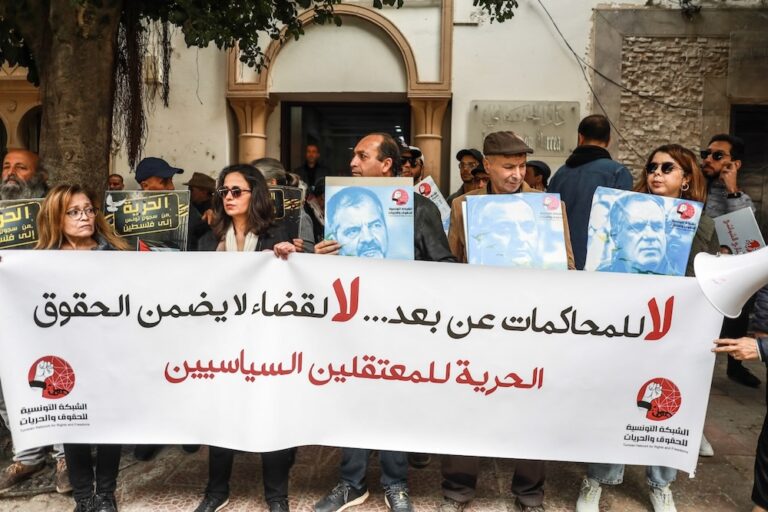(AMARC/HRinfo/WPFC/IFEX) – The following is a 24 April 2006 press release by three members of the IFEX-TMG who participated in a mission to Tunisia: Tunisian Commitments Unfulfilled Following WSIS II Freedom in Tunisia remains well below international standards five months after the World Summit on the Information Society (WSIS) was held in Tunis in November […]
(AMARC/HRinfo/WPFC/IFEX) – The following is a 24 April 2006 press release by three members of the IFEX-TMG who participated in a mission to Tunisia:
Tunisian Commitments Unfulfilled Following WSIS II
Freedom in Tunisia remains well below international standards five months after the World Summit on the Information Society (WSIS) was held in Tunis in November 2005, in spite of commitments made by Tunisian authorities to uphold guarantees to free expression enshrined in international conventions and treaties, to which Tunisia is a signatory.
An International Freedom of Expression Exchange (IFEX) Tunisia Monitoring Group (TMG) mission of three international non-governmental organisations met with various government representatives and Tunisian civil society members from 18 to 22 April 2006 to express their concern. The aim of the mission was to monitor freedom of the press, expression, and association, and related human rights issues. The members of the mission will soon be releasing a follow-up report.
“Freedom of expression continues to be heavily repressed in Tunisia since the WSIS and the Tunisian government has not only failed to improve the situation substantially, it has increased restrictions on human rights defenders, judges and some independent journalists,” remarked Francesco Diasio of the World Association of Community Radio Broadcasters (AMARC). Although journalist Hamdi Jebali has been released, as well as the young Internet users of Zarsis, they continue to face harassment and are denied work.
While it was noted that in some small-circulation newspapers there is now an unprecedented amount of balanced reporting of local issues, the larger circulation official press continues to lack balance. Journalists who were interviewed asserted that self-censorship due to government intimidation and pressure is still rampant.
Organisations – even those legally recognised – continue to be harassed by plain-clothes police, which the mission repeatedly observed firsthand. Opposition activists are often blocked from reaching meetings and gatherings. They have reported that they are constantly under surveillance with communication methods and websites monitored and/or blocked.
The mission was denied a visit to prisoner of conscience Mohammed Abbou – jailed for opinions expressed on the Internet. Government officials informed the mission that the planned visit to Abbou was unlawful. However, members of the TMG mission accompanied Abbou’s wife, Samia Abbou, on her weekly trip to El-Kef, 170 km southwest of the capital, Tunis. After a three-hour drive, Madame Abbou was allowed a 15-minute visit, contrary to prior visits when she has been allocated a mere two minutes. She has faced repeated harassment for speaking out about her husband’s case.
Mohammed Abbou has stopped the hunger strike he began on 11 March to protest his prison conditions, despite the fact that he is subject to harassment in his prison cell and has not even a mattress on which to sleep.
Tunisian government representatives have repeatedly claimed that Abbou and others are “menaces to public order”, but the mission is concerned with the arbitrary nature of imprisonment of opposition activists deemed by authorities to be a threat.
“Circumstances of these arrests raise serious questions about the integrity of the Tunisian judicial system,” said Sally Sami, Programme Coordinator of the Cairo-based Arabic Network for Human Rights Information (HRinfo).
During a meeting with a Tunisian government official, Mark Bench, Executive Director of the Washington D.C. based World Press Freedom Committee (WPFC), demanded on behalf of the mission the immediate release of Abbou and a formal apology for his maltreatment.
The mission also recorded increased harassment of lawyers and judges concerned with their independence from the executive branch. “This is unacceptable when an independent judiciary is key to democracy,” said Diasio.
The results of the fifth IFEX TMG mission since January 2005 will be published shortly in a comprehensive report that will be available on IFEX’s website. Two previous TMG reports are available at http://campaigns.ifex.org/tmg (English), http://campaigns.ifex.org/fr_index.html (French) and http://hrinfo.net/ifex/wsis (Arabic).
Members of the TMG are:
Arabic Human Rights Information Network (HRinfo), Egypt
ARTICLE 19, UK
Canadian Journalists for Free Expression (CJFE), Canada
Egyptian Organization for Human Rights (EOHR), Egypt
Index on Censorship, UK
International Federation of Journalists (IFJ), Belgium
International Federation of Library Associations and Institutions (IFLA), The Netherlands
International Publishers’ Association (IPA), Switzerland
Journaliste en danger (JED), Democratic Republic of Congo
Media Institute of Southern Africa (MISA), Namibia
Norwegian PEN, Norway
World Association of Community Radio Broadcasters (AMARC), Canada
World Association of Newspapers (WAN), France
World Press Freedom Committee (WPFC), USA
Writers in Prison Committee of International PEN (WiPC), UK
Recommended Action:
– Write to Bechir Tekari, Minister of Justice and Human Rights, calling for the release of Mohammed Abbou and other Tunisians imprisoned for peacefully expressing their opinions at e-mail: mju@ministeres.tn, with copies to netwo@intercom.tn


